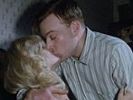Eye For Film >> Movies >> Lipstick On Your Collar (1993) Film Review
The series Lipstick on Your Collar, first aired in 1993, was the last work of the great television playwright and screenwriter Dennis Potter (The Singing Detective, Pennies from Heaven) to make it into production before he passed away (although Karaoke and Cold Lazarus would both screen posthumously). As an adaptation of the stage-play Lay Down Your Arms (1970), Potter succeeds here in providing a truly imaginative and artistically inspired piece of television and, while the series eludes the tangible success of his previous work, it embodies some of his best writing and brilliantly creative verve.
Set in a covert Whitehall office in 1956, the series focuses on the day-to-day activities of a group of intelligence officers who are tasked with the unenviable errand of building intelligence on Russia, as Britain warms up to the Cold War.

Prior to his leap to lofty stardom, a practically newborn Ewan McGregor takes on the role of Private Mick Hopper, whose lurid daydreams give birth to the visual imagining so typical of Potter’s work. Alongside him, an equally fresh-faced Giles Thomas (Human Traffic, Skins) plays his mild-mannered co-conscript, and vessel of surprisingly ferocious and felicitous affection, Private Francis Francis (yes, really!).
The young Private Hopper treats the viewer to some truly jaw-dropping visual escapades in the shape of irreverent reveries that catapult him from the mundanity of office drudgery into a stratosphere of frivolous fantasy and Fifties pop culture. Francis, however, falls prey to a visceral longing for the wife of his superior officer, and newfound neighbour, the errantly irredeemable Corporal Berry (Douglas Henshall).
The six-episodes, collectively, are dorned with an embarrassment of riches in terms of the cast and the quality of the writing. Potter’s auteristic style is manifest throughout, from Hopper’s lip-synced lyrically inspired flights of fancy, to the witty repose with which Clive Francis’ genuinely brilliant Major Wallace Hedges slips into cuttingly caustic reflections on life in Whitehall. While there can be no denying the fact the Lipstick on Your Collar represented a return to more conventional ground for Potter, there are underlying themes of sex and violence that punctuate the generally light-hearted story with a notable sense of seriousness.
The supporting cast signify an additional highlight and are consistently superb throughout. Peter Jeffrey is profoundly pompous in his pomposity as the resident commanding officer Lieutenant-Colonel Harry Bernwood, while Louise Germaine is superb as Mrs Sylvia Berry. As the object of Francis’ affections and a reminder of silver-screen starlets of the era, her seductive saunter awakens a fervent desire in young Francis that moves him to outright rebellion and revelation.
In terms of the evolution of British television, the work of both Dennis Potter and the series director, Renny Rye, can easily be regarded as having a continuingly seminal impact to this day. While it may not have garnered the critical acclaim and lavish recognition of Potter’s earlier work, Lipstick is surely indicative of his unique artistic vision. From the bleak and dreary terraced streets, to the steam infused coffees of burgeoning café culture, Lipstick manages to tingle expectantly at the dawn of fanciful pop culture while also retaining a lingering resonance of life after war.
Reviewed on: 02 Nov 2010


















